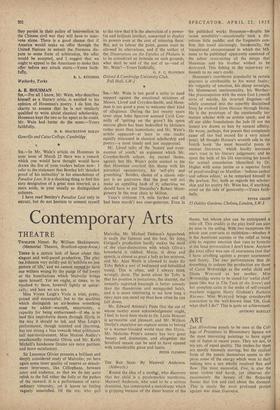Contemporary Arts
THEATRE
• TwEurrst •Thom% By William Shakespeare. (Memorial Theatre, Stratford-upon-Avon.)
THERE is a certain lack of heart about this elegant and well-paced production. The play (asiJohnson very mildly put it) 'exhibits no just picture of life,' and we cannot expee,V,to have our withers wrung by the pangs of the lovers or the humiliations which Malvolio brings upon himself. Yet we ought, at times, to be tquched by them, however lightly or quizzi- cally; and here we are not.
Miss Vivien Leigh's Viola is trim, pretty, poised and resourceful; but to the qualities which distinguish an air-hostess something must be added—warmth, uncertainty, a capacity for being embarrassed—if She is to lead this improbable dance through Illyria in the way it should be led, and Miss Leigh's performance, though talented and charming, has tob strong a bias towards what, politicians call non-involvement. Miss Maxine Audley's unashamedly romantic Olivia and Mr. Keith, Michell's handsome Orsino are more partisan and more satisfactory.
Sir Laurence Olivier presents a brilliant and deeply considered study of Malvolio; yet here again some inner quality of reserve or detach- ment intervenes, like Cellophane, between actor and audience, so that we do not quite relish to the full either the folly or the pathos of the steward. It is a performance of extra- ordinary virtuosity, yet it leaves us feeling vaguely unsatisfied. Of the trio who gull
Malvolio, Mr. Michael Denison's Aguecheek is easily the funniest and the best. Sir John Gielgud's production hardly makes the most of the class-distinctions with which Olivia's household is riddled. Maria, in dress and speech, is almost as great a lady as her mistress, and Mr. Alan Webb is allowed to make Sir Toby Belch a sort of bedizened and befuddled tramp. This is often, and I always think wrongly, done. The point about Sir Toby is that his position is precarious; the discreet, the instantly regretted hiccough is better comedy than the thunderous and unregarded belch, and it is more interesting to see how Ibng a tipsy man can stand up than how often he can fall down.
Mr. Edward Atienza's Feste (for the cut of whose motley some acknowledgement ought, I feel, to have been made to Dr. Leslie Hotson) is serviceable and pleasant, and Mr. William Devlin's impulsive sea-captain seems to belong to a warmer-blooded world than this Illyria. Mr. Malcolm Pride's scenery has very great beauty and distinction, and altogether the Stratford season can be said to have opened with tonsiderable grace and lustre.










































 Previous page
Previous page